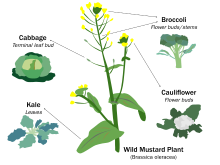History

Plant breeding started with sedentary agriculture and particularly the domestication of the first agricultural plants, a practice which is estimated to date back 9,000 to 11,000 years. Initially early farmers simply selected food plants with particular desirable characteristics, and employed these as progenitors for subsequent generations, resulting in an accumulation of valuable traits over time.
Grafting technology had been practiced in China before 2000 BCE.
By 500 BCE grafting was well established and practiced.
Gregor Mendel (1822–84) is considered the "father of genetics". His experiments with plant hybridization led to his establishing laws of inheritance. Genetics stimulated research to improve crop production through plant breeding.
Modern plant breeding is applied genetics, but its scientific basis is broader, covering molecular biology, cytology, systematics, physiology, pathology, entomology, chemistry, and statistics (biometrics). It has also developed its own technology.
Comments
Post a Comment